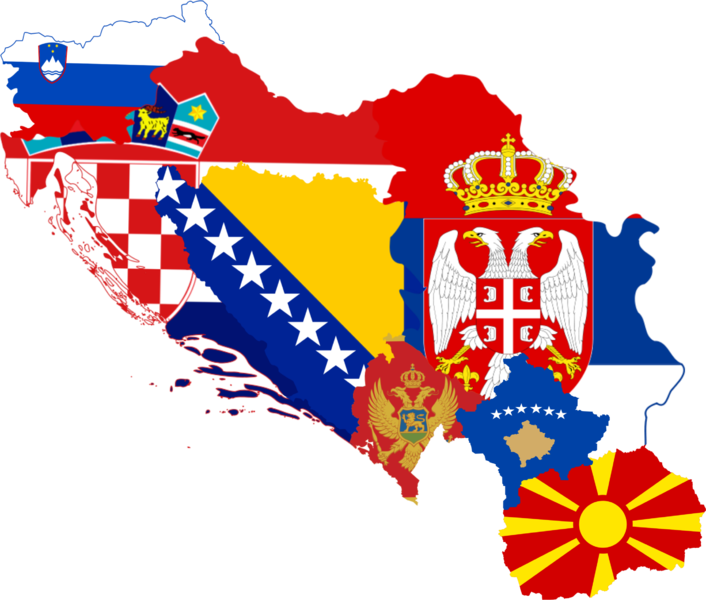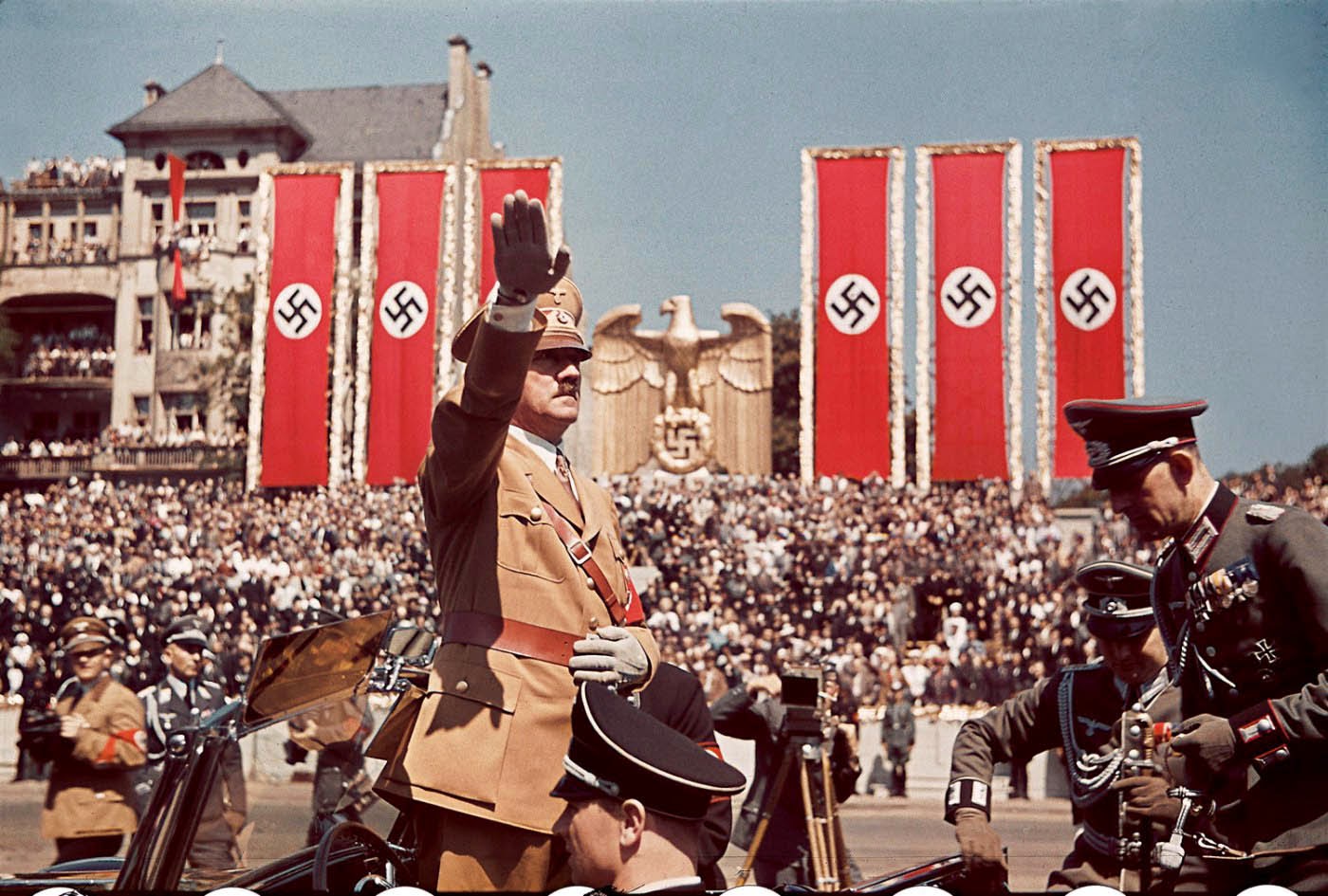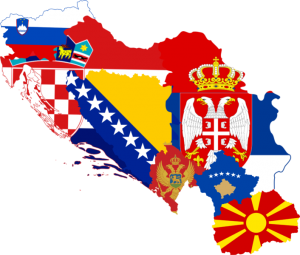
Views: 1169

As recounted in the unjustly neglected German television report “It Began with a Lie,” in April 1999, in the midst of NATO’s illegal bombing campaign against what had remained of Yugoslavia, then German Defense Minister Rudolf Scharping repeatedly accused the Serbian side of installing a Nazi-style “concentration camp” in the soccer stadium in Pristina, the capital of Serbia’s Kosovo and Metohija province. Pressed by the media for proof, Scharping offered “witness testimony” – which he never subsequently produced.
A month earlier, just as the bombing had started, Scharping stated that “we never would have taken military action if there weren’t this humanitarian catastrophe in Kosovo, with 250,000 refugees within Kosovo and far more than 400,000 refugees in total, and with a death toll we are not even able to count yet.”
Yet, key sources contradicted him. The OSCE reported “39 deaths in all of Kosovo—before the NATO bombers came.” Heinz Loquai, a German general attached to the OSCE, stated that “the kind of humanitarian catastrophe that, as a category of international law, would have justified going to war did not exist in Kosovo prior to the war.” And Norma Brown, a U.S. diplomat with the OSCE, confirmed: “There was no humanitarian crisis up to the beginning of the NATO bombing raids.” As the film categorically states, “Not a single report on violence in Kosovo by the OSCE was found to at least indicate an impending humanitarian catastrophe.”
Nevertheless, facts be damned, together with German Prime Minister Schroeder, Scharping and Foreign Minister Joschka Fischer got what they wanted – not just the bombing and the further atomization of the former Yugoslav space, but the first post-WW II engagement of German forces in an offensive military mission. It lasted 78 days and entailed the dropping of 22,000 tons of missiles, including forbidden cluster bombs and depleted uranium ammunition, and active cooperation with a terrorist organization, the Albanian KLA, resulting in thousands of civilian and military dead and wounded, the displacement of hundreds of thousands of civilians and the destruction of tens of billions of dollars in property and infrastructure.
A little over 20 years later, shortly before the beginning of another evidence-free propaganda push, this time directed at Russia, involving the alleged poisoning of Alexey Navalny, the present German Defense Minister, Annegret Kramp-Karrenbauer, opened her cards. Speaking to the Die Zeit weekly in July, Kramp-Karrenbauer stressed that it was “high time” to discuss “how Germany must position itself in the world in the future,” adding that Germany is “expected to show leadership, not only as an economic power”, but also in terms of “collective defence… international missions… a strategic view of the world,” and “the question of whether we want to actively shape the global order.”
In another July conversation, this time with the Atlantic Council, Kramp-Karrenbauer also made sure to identify the main adversary: “We see an aggressive, assertive policy coming from the Russian leadership,” she said, referring to Crimea’s reunification with Russia in 2014. “Russia has no respect for the right of self-determination of other countries. It was the first time since the Second World War that borders have been changed with force.”
Except, as referenced above, it wasn’t. For, despite the still-existing UN SC Resolution 1244, which affirms the territorial integrity of FR Yugoslavia’s successor, Serbia, pending a final political settlement, Germany stands proudly among the states that have recognized the unilateral secession of Serbia’s historic southern province. This despite the fact that this particular change of borders had come about as a result of precisely the forceful methods that the German Defense Minister is now supposedly decrying, even as her own country used them and geopolitically benefitted from them.
Having all this in mind, it shouldn’t be a surprise to learn that, in the recent words of Russian Foreign Minister Sergey Lavrov, “the brain trusts and political analysts with close ties to the German government have openly started working on a new Eastern policy,” which includes abrogation of the strategic partnership with Russia, which is now to be treated as an “adversary” of the EU and NATO. Obviously, the decision-makers in Berlin have concluded that the time is ripe to take the next step.
To even debate whether the Navalny affair was an understandable trigger for Germany’s seeming strategic about-face or just a convenient pretext is to engage in useless feigning of naivete. For if whatever happened to Navalny was honestly seen by the German government as something that might endanger an important strategic relationship, surely the German authorities would have done everything possible to get to the bottom of it in a maximally transparent way, shared the evidence and let the chips fall where they may. Which, of course, is the one thing they have not done nor, as it stands, plan to do, despite numerous Russian appeals.
Thus, in assessing Germany’s new Drang nach Osten, it is important to note that the German political elite’s aggressive behavior did not start yesterday and has little to do with Navalny. It was methodically developed in the 1990s, during the violent break-up of Yugoslavia and polished in the demonization campaign of the closest Yugoslav Russian ally, Serbia. And, while the lies and exaggerations of German politicians were egregious and deadly as regards the NATO bombing of Yugoslavia, it is important to remind that the negative German role in the entire Yugoslav crisis could be traced backed even further, to the very beginnings of the Yugoslav tragedy.
As the New York Times reported in January 1992, it was Germany that pushed the major European states to recognize the unilaterally declared independence of the breakaway republics Slovenia and Croatia. The Serbian Foreign Minister Vladislav Jovanovic described Germany’s role as “particularly negative,” adding that it was “very serious precedent to encourage unilateral secession in one multinational state.” Even then, a commentary in Bonn’s main newspaper, the General-Anzeiger, cautioned that “the fear of German dominance and unilateralism has grown.” Carl Cavanagh Hodge called it “one of the most precipitous acts in post-Cold War Europe” by which “the Bonn government in effect renounced the legitimacy of the existing Yugoslav state and pressured other European governments to do the same.” In her book “Balkan Tragedy,” Susan Woodward criticized the “German maneuver” that pressured other EC members to recognize Slovenia and Croatia, and concluded: “The precedent set by the German maneuver was that the principle of self-determination could legitimately break up multinational states, that EC application of this principle was arbitrary, and that the surest way for politicians bent on independence to succeed was to instigate a defensive war and win international sympathy and recognition.”
It would be rather naive to think that the German political establishment was unaware of the effects of its actions. Nevertheless, the Goebbelsian barrage against the Serbs would only increase in intensity, with Foreign Minister Klaus Kinkel openly demanding that “Serbia must be brought to its knees,” in the aftermath of the infamous Sarajevo “breadline massacre” in late May 1992, for which he, along with most other Western diplomats and media, immediately accused Bosnian Serb forces, sans evidence, naturally. In fact, there were serious indications, expressed in confidential UN reports, that the Bosnian Muslims had “slaughtered their own people” in order to pin the blame on the Serbs and force the Cold War victors’ interventionist hand. Conveniently, the attack came shortly before a meeting of European Community ambassadors to consider imposing sanctions on Serbia.
Surely Kinkel must have been aware of such reports and doubts. But he nevertheless plowed on. And the German media for the most part followed. It seemed even then that the newly reunified Germany’s political class was almost desperate to find “Nazis” abroad to kick around. Especially if the label could be pinned on one of the peoples that suffered the most casualties at the hands of Hitler’s armies. The more cynically minded might have seen it as a useful exercise to liberate the national psyche from the decades-long burden of collective guilt. But, in retrospect, it seems to have been more deliberate than that, which is not something that was not suspected in Serbian circles at the time.
If the goal of reunified Germany’s elites from the start was to regain great power status – under cover of the EU if at all possible – then it was necessary to not only grow in strength economically and militarily, but also in terms of soft power. And the latter entails, among other things, some real or manufactured moral high ground. For the ambitions of reunified Germany’s governing elites, that obviously meant not only dissociation from the Nazi horrors – which post-war Germany had admirably done up to the fall of the Berlin Wall, to be sure – but the ability to project a similar type of guilt onto its former – and, it seems, future adversaries and past victims. First Serbia, and now, increasingly, Russia.
It has taken Germany almost three decades to feel that it has gained sufficiently high “moral ground” from which it could feel confident enough to launch its brazen, evidence-free campaign of accusing Russia of responsibility for whatever really happened to Alexey Navalny. Along the way, let us not forget, Germany not only openly supported the Euromaidan coup but joined the Western chorus of anti-Russian condemnation and sanctions-mongering in connection with Ukraine as well as with another highly suspect “the Russians did it” poisoning ploy, involving Sergey Skripal and his daughter – who seem to have been conveniently “disappeared” after the affair had served its propaganda purpose.
It is one thing for a country the size and wealth of Germany to seek its rightful place in the world. It’s quite another, however, to do it in such an aggressive and dishonest way, for that inevitably raises questions regarding the motives in play. If a country responsible for two world wars over the past century launches a deliberate campaign of falsehoods directed at its past victims, it is fair to conclude that it may be on the move again, or soon will be. Using other means, but with similar goals.
Originally published on 2020-10-30
Author: Aleksandar Pavic
Source: Strategic Culture Foundation
Origins of images: Facebook, Twitter, Wikimedia, Wikipedia, Flickr, Google, Imageinjection, Public Domain & Pinterest.
Read our Disclaimer/Legal Statement!
Donate to Support Us
We would like to ask you to consider a small donation to help our team keep working. We accept no advertising and rely only on you, our readers, to keep us digging the truth on history, global politics, and international relations.
FOLLOW US ON OUR SOCIAL PLATFORMS










